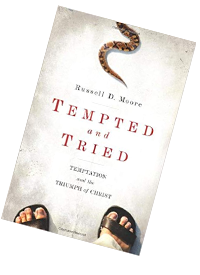Back to series

RECOMMENDED READING:

Temptation and Testing
Click here to open a Print - Friendly PDF
 Oscar Wilde, the famous Irish playwright, humorously said, “I can resist everything except temptation.” In his case, it was quite true, especially when the temptation was sexual encounters with young men. Yielding himself to temptation brought shame and disgrace in his personal life and wrecked a very promising career.
Oscar Wilde, the famous Irish playwright, humorously said, “I can resist everything except temptation.” In his case, it was quite true, especially when the temptation was sexual encounters with young men. Yielding himself to temptation brought shame and disgrace in his personal life and wrecked a very promising career.
The world increasingly ignores, laughs at, or even mocks the idea of sin, and today many Christians don’t take it seriously either. Like the young Augustine, we might want to be delivered from our sins at some point but not yet. But God takes sin very seriously—far more seriously than we do. We either obey God or disobey him, there is no other option, and he holds us accountable for our choices. We make our choices, and then our choices make us. Those choices put us on one of two roads through life, the easy way that leads to destruction or the hard way that leads to life (Matt. 7:13–14). Temptation and testing are intimately bound up with these decisions.
In this article, we will look at what the Bible teaches about the nature of temptation, its sources and consequences, and how to overcome it. We will also look at the closely related theme of testing. Passing tests and overcoming temptations are significant means of growth in the Christian life.
The Nature of Temptation and Testing
 Temptation to sin has been universal throughout human history; no one has ever been exempt from it or from the consequences of yielding to it. In the Bible, temptation is an enticement to act in disobedience to God’s will. Its sources are the world, the flesh, and the devil. A test is a situation that God sends or allows in our life with the intention of revealing our loyalties, motivations, character, and commitment to Him and helping to purify, strengthen, and mature us. If successfully passed, a test also glorifies God. Tests and temptations occur throughout our lives and are an important part of the process of maturing spiritually.
Temptation to sin has been universal throughout human history; no one has ever been exempt from it or from the consequences of yielding to it. In the Bible, temptation is an enticement to act in disobedience to God’s will. Its sources are the world, the flesh, and the devil. A test is a situation that God sends or allows in our life with the intention of revealing our loyalties, motivations, character, and commitment to Him and helping to purify, strengthen, and mature us. If successfully passed, a test also glorifies God. Tests and temptations occur throughout our lives and are an important part of the process of maturing spiritually.
The following stories illustrate how God ordains tests in order to reveal what is in our hearts, to help us grow in grace, to advance His purposes, and to bring Him glory in the world. God’s intention is always that we emerge from tests victorious and spiritually stronger. How we respond determines the outcome. If we are devoted to God, know His word, pray, and rely on the power of the Holy Spirit, we can overcome any enticements and successfully pass through any test or temptation we encounter.
Major Examples of Temptation and Testing
Testing and temptation first appear in the Bible in the Garden of Eden with Adam and Eve. This ancient story contains valuable insights for us today. Here we see that God lovingly placed our first parents in a beautiful garden, which abounded with everything they needed for human flourishing. He set only one restriction: “You may surely eat of every tree of the garden, but of the tree of the knowledge of good and evil you shall not eat, for in the day you eat of it you shall surely die” (Gen. 2:16–17).
1God designed this test to give Adam and Eve the opportunity to demonstrate their gratitude, love, and trust in Him by obeying one simple command. However, tests hold the possibility of failure. And failure is the goal of the devil, who rages against God and His people with an implacable hatred. He will tempt those who are being tested to disobey God. What God means for good, the devil will try to exploit for evil. The following account of what happened in the garden demonstrates this fact and also gives us good lessons for resisting his schemes:
Now the serpent was more crafty than any other beast of the field that the Lord God had made.
He said to the woman, “Did God actually say, ‘You shall not eat of any tree in the garden’?” And the woman said to the serpent, “We may eat of the fruit of the trees in the garden, but God said, ‘You shall not eat of the fruit of the tree that is in the midst of the garden, neither shall you touch it, lest you die.’” But the serpent said to the woman, “You will not surely die. For God knows that when you eat of it your eyes will be opened, and you will be like God, knowing good and evil.” So when the woman saw that the tree was good for food, and that it was a delight to the eyes, and that the tree was to be desired to make one wise, she took of its fruit and ate, and she also gave some to her husband who was with her, and he ate. (Gen. 3:1–6)
 An important point to note as we start is that when the devil tempts us, he doesn’t appear in hoofs and horns. He appears in an appealing guise. As Shakespeare said, “The devil hath power to assume a pleasing shape.” The serpent is described as crafty; very likely he was also beautiful, like a beautiful emerald viper, not like a hissing cobra or rattlesnake. The tempter’s seemingly innocent initial approach was actually a deceptive ploy to ensnare Eve. He quickly moved to directly contradict God’s word about the consequences of eating the fruit, saying, “You will not surely die. For God knows that when you eat of it your eyes will be opened, and you will be like God, knowing good and evil” (Gen. 3:4–5). In this deft move, he undermined Eve’s trust in God’s goodness by contending that God was withholding something good from her: “to be like God.” By introducing unbelief, followed by an appeal to pride, he cleverly placed a powerful temptation before her. Eve could have passed the test by simply obeying God’s command, for the tempter could not have forced her to eat the fruit. Instead, she considered the apparent benefits of eating: it was good for food, a delight to the eyes, and desirable to make one wise. She freely chose to disobey God, and she ate the fruit. She gave it to her husband, and he too ate from it. That one tragic choice brought disastrous consequences upon them, their family, and every other person who has ever lived: it alienated them from God, brought Eve pain in childbearing and Adam futility in work, fratricide in their family, and all manner of other suffering, and led to eventual physical death. It also plunged the world into a catastrophic rebellion against God that has produced untold pain, suffering, and misery to the present day.
An important point to note as we start is that when the devil tempts us, he doesn’t appear in hoofs and horns. He appears in an appealing guise. As Shakespeare said, “The devil hath power to assume a pleasing shape.” The serpent is described as crafty; very likely he was also beautiful, like a beautiful emerald viper, not like a hissing cobra or rattlesnake. The tempter’s seemingly innocent initial approach was actually a deceptive ploy to ensnare Eve. He quickly moved to directly contradict God’s word about the consequences of eating the fruit, saying, “You will not surely die. For God knows that when you eat of it your eyes will be opened, and you will be like God, knowing good and evil” (Gen. 3:4–5). In this deft move, he undermined Eve’s trust in God’s goodness by contending that God was withholding something good from her: “to be like God.” By introducing unbelief, followed by an appeal to pride, he cleverly placed a powerful temptation before her. Eve could have passed the test by simply obeying God’s command, for the tempter could not have forced her to eat the fruit. Instead, she considered the apparent benefits of eating: it was good for food, a delight to the eyes, and desirable to make one wise. She freely chose to disobey God, and she ate the fruit. She gave it to her husband, and he too ate from it. That one tragic choice brought disastrous consequences upon them, their family, and every other person who has ever lived: it alienated them from God, brought Eve pain in childbearing and Adam futility in work, fratricide in their family, and all manner of other suffering, and led to eventual physical death. It also plunged the world into a catastrophic rebellion against God that has produced untold pain, suffering, and misery to the present day.
What are some of the lessons we can learn from this story? An obvious one is the devil’s subtlety in lying and deception, which are his major tactics throughout the Bible. Another is his malevolent war against God and His word. His hatred of human beings is very clear, along with his cunning schemes to deceive, seduce, and tempt us in order to thwart God’s kingdom purposes, alienate us from God, and bring suffering and judgment upon us. On full display as well is our great vulnerability to temptation and our need to be alert to the sinful things that appeal to our desires. The folly of allowing sinful attractions to linger in our minds and looking only at the appealing features of sin and not the high and painful price we will have to pay for it is another very important lesson. Implicit in the story is our great need to quickly turn to God when tempted and to reject evil thoughts and not allow them to linger in our minds. We also see here the root problems of unbelief and pride, such powerful avenues of temptation, and the tragic consequences of failing a test God has set before us.
 The seduction of Adam and Eve also illustrates that the devil seeks opportunities for strategic impact against God, as was certainly the case here. This helps us understand why he puts a high priority on attacking those who are close to God or have potential for greater kingdom impact or are more prominent in His service and thus are a special threat to his evil empire. He not only eliminates a threat, but also reaps great gains by bringing discouragement and disillusionment to the many people who saw them as exemplars.
The seduction of Adam and Eve also illustrates that the devil seeks opportunities for strategic impact against God, as was certainly the case here. This helps us understand why he puts a high priority on attacking those who are close to God or have potential for greater kingdom impact or are more prominent in His service and thus are a special threat to his evil empire. He not only eliminates a threat, but also reaps great gains by bringing discouragement and disillusionment to the many people who saw them as exemplars.
In the life of Abraham, we see a very different kind of test that offers valuable lessons. Temptation to sin is not so prominent here (though it is always a possibility in any test). God called Abram to leave his family, home, and country and go to a land he had never seen (Gen. 12:1–3).
It was a long and dangerous journey with many hazards and no one to rely on but God. The test here was one of exercising faith and obedience—of trusting God to guide and protect and bless him as God had promised. Abram, whose name was later changed to Abraham, stepped out in the obedience of faith, passed this test, and experienced great blessings from God. Other tests followed, some of which he passed and some he didn’t. Late in life, he faced his most difficult test when God commanded him to take his son Isaac to Mount Moriah and offer him there as a sacrifice to Him (Gen. 22:1–19).
This powerful story shows how much Abraham’s faith had grown over the years, enabling him to obey this unimaginably hard command. Testing is a key to growing stronger in faith. It also illustrates the great blessings God pours out on those who trust and obey Him. Abraham is a classic example of our need for resolute faith in God, a faith that acts, even when we cannot see how everything will work out in the end. Abraham is called the father of the faithful in the New Testament; his life offers other lessons in faith and is well worth reading (Gen. 12–25; Heb. 11:8–12, 17–19; Rom. 4:17–22).
In Job we see a still more different testing situation. Like Abraham, Job was devoted to God. He is described as “blameless and upright, one who feared God and turned away from evil” (Job 1:1). God loved Job and blessed him greatly. He became extremely wealthy and had many children, for whom he prayed daily. But God put Job through the most harrowing trial recorded of a human being in the Bible. He allowed the devil to savagely attack Job to publicly demonstrate Job’s faithfulness and righteousness. It was an epic contest between God and the devil, visible only to angels and demons, but with great ramifications. The devil stripped Job of all his wealth, killed all of his children, and afflicted him with painful sores from head to foot. His condition became so bad that Job’s wife urged him to curse God and die. Yet in spite of all his loss, pain, suffering, and despair, Job remained faithful. He had many hard questions for God and voiced many complaints, and he never did understand the cosmic contest in which he was the central actor. But through it all, he remained faithful to God. Even in the midst of his despair, he could say, “though he slay me, yet will I hope in him” (Job 13:15 NIV). Job passed the test that was set before him, and God was glorified, though Job never got the answers he wanted or an explanation of why God had allowed him to undergo such terrible suffering though he had not sinned.
 An obvious significant lesson we see in Job is that being close to God will not spare us from temptation, trials, and affliction. Equally obviously is that God’s purposes are sometimes mysterious and hidden from our sight. Another lesson, found in the first two chapters, is that the devil is ultimately under God’s sovereign control and cannot touch us without God’s permission. We also see that God will not permit the devil to tempt or afflict us unless it will ultimately work for our good and God’s glory (Rom. 8:28). Yet another lesson is that God is not obligated to answer our questions (though He sometimes does). The last four chapters show that God used Job’s trials to bring him into a deeper personal knowledge of himself and rewarded him with even more wealth and children than he had before. Job’s faithfulness through his suffering glorified God then and still does today. And it has had a deep and enduring impact over the centuries on those in danger of losing their faith when in difficult trials.
An obvious significant lesson we see in Job is that being close to God will not spare us from temptation, trials, and affliction. Equally obviously is that God’s purposes are sometimes mysterious and hidden from our sight. Another lesson, found in the first two chapters, is that the devil is ultimately under God’s sovereign control and cannot touch us without God’s permission. We also see that God will not permit the devil to tempt or afflict us unless it will ultimately work for our good and God’s glory (Rom. 8:28). Yet another lesson is that God is not obligated to answer our questions (though He sometimes does). The last four chapters show that God used Job’s trials to bring him into a deeper personal knowledge of himself and rewarded him with even more wealth and children than he had before. Job’s faithfulness through his suffering glorified God then and still does today. And it has had a deep and enduring impact over the centuries on those in danger of losing their faith when in difficult trials.
In the New Testament, the most instructive and helpful example of testing and temptation is that of Jesus, which occurs at the beginning of his Messianic ministry. This story gives us some vital lessons for overcoming temptation and passing the tests God sets before us.
Then Jesus was led up by the Spirit into the wilderness to be tempted by the devil. And after fasting forty days and forty nights, he was hungry. And the tempter came and said to him, “If you are the Son of God, command these stones to become loaves of bread.” But he answered, “It is written, “‘Man shall not live by bread alone, but by every word that comes from the mouth of God.’” Then the devil took him to the holy city and set him on the pinnacle of the temple and said to him, “If you are the Son of God, throw yourself down, for it is written, “‘He will command his angels concerning you,’ and “‘On their hands they will bear you up, lest you strike your foot against a stone.’” Jesus said to him, “Again it is written, ‘You shall not put the Lord your God to the test.’” Again, the devil took him to a very high mountain and showed him all the kingdoms of the world and their glory. And he said to him, “All these I will give you, if you will fall down and worship me.” Then Jesus said to him, “Be gone, Satan! For it is written, “‘You shall worship the Lord your God and him only shall you serve.’” Then the devil left him, and behold, angels came and were ministering to him. (Matt. 4:1–11)
 The great test here is whether Jesus, the Second Adam, would pass the challenge God set before him: would he follow the path of humble, suffering servanthood to fulfill his Messianic mission, or would he succumb to the temptation to accomplish his mission through worldly, political means? The devil had laid subtle snares to entrap Jesus at the end of a forty-day fast. His initial approach focused on a legitimate and immediate felt need—food. Jesus, recognizing the snare, cited the biblical principle that applied, and refused to use His power to make bread from stones. He had complete trust in His Father to provide what He needed to eat when He needed it. The next temptation was the challenge to demonstrate His Sonship in a presumptuous way by forcing God to act. Again, Jesus saw the trap, cited the biblical principle that must guide Him, and refused. Finally, the devil cast aside all subtleties and called on Jesus to worship Him and thereby gain world domination, avoiding the pain and suffering of the cross. This is the idea that the end justifies the means, which is so popular today. Then, as now, the devil seeks to deceive us into thinking that the easier way is better than the harder way.
The great test here is whether Jesus, the Second Adam, would pass the challenge God set before him: would he follow the path of humble, suffering servanthood to fulfill his Messianic mission, or would he succumb to the temptation to accomplish his mission through worldly, political means? The devil had laid subtle snares to entrap Jesus at the end of a forty-day fast. His initial approach focused on a legitimate and immediate felt need—food. Jesus, recognizing the snare, cited the biblical principle that applied, and refused to use His power to make bread from stones. He had complete trust in His Father to provide what He needed to eat when He needed it. The next temptation was the challenge to demonstrate His Sonship in a presumptuous way by forcing God to act. Again, Jesus saw the trap, cited the biblical principle that must guide Him, and refused. Finally, the devil cast aside all subtleties and called on Jesus to worship Him and thereby gain world domination, avoiding the pain and suffering of the cross. This is the idea that the end justifies the means, which is so popular today. Then, as now, the devil seeks to deceive us into thinking that the easier way is better than the harder way.
What can we learn from the temptation of Jesus that will help us in our own tests and temptations? First, Jesus had a supreme love for and trust in His heavenly Father, and this is seen in His unwavering determination to please Him through obeying His will. God was first in His mind and heart and actions. We must follow His example in this. Second, it is clear from His responses to the devil that Jesus had deep knowledge of the meaning and proper application of the Scriptures. He gained this through much listening to, reading, memorizing, and meditating on God’s Word. His example here is also one that is vital for us to follow. Third, Jesus did not rely on His own strength or wisdom to combat the devil but was empowered by the Holy Spirit as He faced each of these temptations. Only as we live daily in the fullness of the Holy Spirit can we experience victory. These lessons are essential for us to internalize and incorporate into our lives if we are to successfully overcome the temptations we face in life and pass the tests God sets before us.
Sources and Dynamics of Temptation
The stories of Adam and Eve, Job, and Jesus could give the impression that the devil is the only source of our temptation, but that is not correct. There are two other major enemies at work against us: the world and the flesh. By “the world,” we do not mean the beautiful earth God created but, rather, the fallen world system that is in rebellion against God. The apostle John warned against love of the world:
Do not love the world or the things in the world. If anyone loves the world, the love of the Father is not in him. For all that is in the world—the desires of the flesh and the desires of the eyes and pride of life—is not from the Father but is from the world. And the world is passing away along with its desires, but whoever does the will of God abides forever. (1 John 2:15–17)
 The things of this world can easily appeal to our desires and establish a foothold in our hearts. This is especially true in today’s world, which constantly bombards us with seductive messages from advertising and marketing agencies. John describes the things of the world in terms of three different families of desires and says if we succumb to any of them we are turning our backs on God and foolishly chasing after what is passing away. The “desires of the flesh” cover a broad area, not just sexual sins, but desires for wealth, power, fame, success, and a host of other things. In light of our continuous exposure to such temptations in their many forms, we must learn to discipline our thought life, specifically, the things we allow our minds to dwell on. The “desires of the eyes” refers to the many things that capture our attention through our sight, the entry point for many temptations. Here again we need to discipline our eyes—what we allow ourselves to look at— and avoid things that will draw our thoughts to sin. The “pride of life” consists of boasting of all that we have and do. It is, in a word, self-exaltation, the desire for attention and recognition that is so pervasive in today’s narcissistic society and the church.
The things of this world can easily appeal to our desires and establish a foothold in our hearts. This is especially true in today’s world, which constantly bombards us with seductive messages from advertising and marketing agencies. John describes the things of the world in terms of three different families of desires and says if we succumb to any of them we are turning our backs on God and foolishly chasing after what is passing away. The “desires of the flesh” cover a broad area, not just sexual sins, but desires for wealth, power, fame, success, and a host of other things. In light of our continuous exposure to such temptations in their many forms, we must learn to discipline our thought life, specifically, the things we allow our minds to dwell on. The “desires of the eyes” refers to the many things that capture our attention through our sight, the entry point for many temptations. Here again we need to discipline our eyes—what we allow ourselves to look at— and avoid things that will draw our thoughts to sin. The “pride of life” consists of boasting of all that we have and do. It is, in a word, self-exaltation, the desire for attention and recognition that is so pervasive in today’s narcissistic society and the church.
Our third major enemy is the “flesh,” a term that refers not to the meat on our bones but to the values, attitudes, desires, and behaviors of the fallen world system. The flesh dominated and shaped our lives, our “old self” before we came to Christ. Although the flesh was dethroned when we were united with Christ at conversion and no longer rules over us, it was not totally destroyed. It can still tempt us without any help from the devil, though the devil often exploits it to ensnare us.
James describes how fleshly temptation operates through our desires.
Let no one say when he is tempted, ‘I am being tempted by God,’ for God cannot be tempted with evil, and he himself tempts no one. But each person is tempted when he is lured and enticed by his own desire. Then desire when it has conceived gives birth to sin, and sin when it is fully grown brings forth death.” (James 1:13–15)
 Notice his emphatic contention that that God will never tempt us to sin. This is crucial to understand. Although God allows us to be tempted by the world, the flesh, and the devil, God Himself never tempts us to sin. Interestingly, James does not mention the devil in this connection. This is because the devil cannot force or compel us to sin; all he can do is propose and entice. Neither the devil nor circumstances cause people to give in to temptation; they are simply the occasion of it. Human moral choice is the cause. Regardless of the source of temptation, we are responsible for the choices we make. That is why James put the focus on our desires, which are vulnerable to being attracted, lured, and enticed by sinful longings.
Notice his emphatic contention that that God will never tempt us to sin. This is crucial to understand. Although God allows us to be tempted by the world, the flesh, and the devil, God Himself never tempts us to sin. Interestingly, James does not mention the devil in this connection. This is because the devil cannot force or compel us to sin; all he can do is propose and entice. Neither the devil nor circumstances cause people to give in to temptation; they are simply the occasion of it. Human moral choice is the cause. Regardless of the source of temptation, we are responsible for the choices we make. That is why James put the focus on our desires, which are vulnerable to being attracted, lured, and enticed by sinful longings.
James used the analogy of conception and birth to show that temptation is far more easily defeated at the beginning than later, after it has gained a foothold. He described a process of gestation: when tempted, if we decide to consider the suggestion, a process begins, as it did with Eve in the garden: first we consider what appear to be the benefits, then delight grows stronger and our will to resist grows weaker, and finally we consent. This process can happen quickly or over time.
Whenever a sinful suggestion comes to mind, we have a binary decision to make. We either refuse immediately, or we do not. If we refuse, it may well go away at once. If it doesn’t, we may need to refuse repeatedly and possibly even seek prayer support from other believers. But if we continue to reject it, it will not take root.
Resources for Overcoming Temptation
What resources does God give us to overcome temptation? Jesus placed a very high priority on prayer. He instructs us to ask God to “lead us not to into temptation” (Matt. 6:13), that is, temptation greater that we can bear. This is reinforced by His exhortation to His first disciples in the garden of Gethsemane: “Watch and pray that you may not enter into temptation. The Spirit indeed is willing, but the flesh is weak” (Matt. 26:41). This command is just as applicable today as it was then. Jesus empathizes with us in our temptation; He personally intercedes for us with the Father and is ready to help whenever we call on Him, “because he himself has suffered when tempted, he is able to help those who are being tempted” (Heb. 2:18). Jesus prayed earnestly through the many and varied temptations of his life, therefore, “we do not have a high priest who is unable to sympathize with our weaknesses, but one who in every respect has been tempted as we are, yet without sin. Let us then with confidence draw near to the throne of grace, that we may receive mercy and find grace to help in time of need” (Heb. 4:15–16). We need to memorize this verse and use it often.
Another important lesson in this passage is that it is not a sin to be tempted. Jesus was tempted just as we are, though He never succumbed. This is a vital truth to hold onto, for if we mistakenly think it is a sin to have tempting thoughts and desires, we will come to see our situation as hopeless, give up resisting, fail to overcome, and live in perpetual defeat and discouragement.
Jesus also placed a high priority on the Holy Scriptures. He believed that the Scriptures were inspired by God and fully trustworthy. He had immersed Himself in them and was therefore able to correctly discern the nature of the temptations He faced in life and the proper way to respond. Like Him, we also need to regularly read, study, memorize, and meditate on the Scriptures. Spending time daily in the Bible and prayer is not optional. Rather, it is a critical part of the process of renewing our minds and learning to recognize and do God’s will and deal effectively with temptation when it comes.
Jesus especially depended on Holy Spirit, who strengthened Him when He was tempted in the desert. If the Holy Spirit and His power were essential to Jesus in fighting temptation, how much more is that true for us! Unfortunately, many Christians today are not filled with the Holy Spirit and therefore lack spiritual power in their lives. Thus they experience frequent defeat when tempted. Although every true Christian has the Holy Spirit residing within, every Christian does not necessarily have the Spirit reigning within. To be filled with the Spirit—to have Him reigning in us—means consciously placing ourselves under His control and keeping in step with His leading through the day. Placing ourselves under the Spirit’s control requires us to surrender ourselves to God as fully as we know how. As Paul urged the Romans, “present your bodies as a living sacrifice, holy and acceptable to God, which is your spiritual worship” (Rom. 12:1). As we do this, the Spirit will be able to lead us because we are no longer resisting Him. But as long as we are trying to retain control of our lives, we hinder His leading and limit His power in our lives.
 How will the Spirit lead us? As His name suggests, the Holy Spirit will always be seeking to lead us into holiness—Christlikeness. What does that look like? The life of Christ was one of sacrificial, wholehearted love for God and love for others. This is manifested in us in the fruit of the Spirit (Gal. 5:22–23): love, joy, peace, patience, kindness, goodness, gentleness, faithfulness, and self-control. An important part of the process of becoming like Christ is putting to death the remaining sin in our lives, and this is a primary operation of the Holy Spirit. In this context, we can call on Him to help us fight off any temptations that confront us during the day. He will lead us to say no to fleshy desires and empower us to do so. Paul emphasizes this when he says, “walk by the Spirit, and you will not gratify the desires of the flesh” (Gal. 5:16). We should expect that in keeping with Jesus’ teaching, the Spirit will lead us to wage a ruthless, ongoing battle against the remaining sin in our lives. Using hyperbole to emphasize this point, Jesus said,
How will the Spirit lead us? As His name suggests, the Holy Spirit will always be seeking to lead us into holiness—Christlikeness. What does that look like? The life of Christ was one of sacrificial, wholehearted love for God and love for others. This is manifested in us in the fruit of the Spirit (Gal. 5:22–23): love, joy, peace, patience, kindness, goodness, gentleness, faithfulness, and self-control. An important part of the process of becoming like Christ is putting to death the remaining sin in our lives, and this is a primary operation of the Holy Spirit. In this context, we can call on Him to help us fight off any temptations that confront us during the day. He will lead us to say no to fleshy desires and empower us to do so. Paul emphasizes this when he says, “walk by the Spirit, and you will not gratify the desires of the flesh” (Gal. 5:16). We should expect that in keeping with Jesus’ teaching, the Spirit will lead us to wage a ruthless, ongoing battle against the remaining sin in our lives. Using hyperbole to emphasize this point, Jesus said,
If your right eye causes you to sin, tear it out and throw it away. For it is better that you lose one of your members than that your whole body be thrown into hell. And if your right hand causes you to sin, cut it off and throw it away. For it is better that you lose one of your members than that your whole body go into hell. (Matt. 5:29–30)
Paul echoes this in Rom. 8:13, “If by the Spirit you put to death the deeds of the body, you will live.” As John Owen put it, “We must be killing sin or sin will be killing us.”
 It is very important to be alert to our areas of vulnerability—those sins to which we are especially susceptible. The devil will attack us at our weak points, not our strong ones. As Richard Sibbes observed, “It is Satan’s practice to go over the fence where it is lowest.” Paul calls the Corinthians (and us) to be sober-minded and realistic about their own hearts. None of us is so spiritually strong that we are invincible, and the implicit or explicit assumption that we are so is very dangerous. The devil knows exactly where to tempt you. Like a master fisherman, he will bait his hook according to the appetite of the fish. For Achan, it was silver, gold, and a beautiful cloak (Josh. 7); for David it was Bathsheba (2 Sam. 11:2–5); Peter denied Jesus three times because of his fear (John 13:37–38); love of the world caused Demas, part of the inner circle of Paul’s apostolic ministry team, to desert Paul at his darkest hour (2 Tim. 4:9–10). Even more shocking, God actually appeared twice to Solomon, who was the wisest man of his day, yet later in life he succumbed to the temptation of women and idolatry (1 Kings 11).
It is very important to be alert to our areas of vulnerability—those sins to which we are especially susceptible. The devil will attack us at our weak points, not our strong ones. As Richard Sibbes observed, “It is Satan’s practice to go over the fence where it is lowest.” Paul calls the Corinthians (and us) to be sober-minded and realistic about their own hearts. None of us is so spiritually strong that we are invincible, and the implicit or explicit assumption that we are so is very dangerous. The devil knows exactly where to tempt you. Like a master fisherman, he will bait his hook according to the appetite of the fish. For Achan, it was silver, gold, and a beautiful cloak (Josh. 7); for David it was Bathsheba (2 Sam. 11:2–5); Peter denied Jesus three times because of his fear (John 13:37–38); love of the world caused Demas, part of the inner circle of Paul’s apostolic ministry team, to desert Paul at his darkest hour (2 Tim. 4:9–10). Even more shocking, God actually appeared twice to Solomon, who was the wisest man of his day, yet later in life he succumbed to the temptation of women and idolatry (1 Kings 11).
Do you know your heart well enough to be aware of the areas where you are particularly vulnerable? I trust so, for such awareness enables us to avoid situations, places, and people that may be a source of temptation. At times, we may need to seek counsel from a wise and godly pastor or elder or an accountability partner for wisdom and prayer support in overcoming temptation. There are some situations when temptation is so intense that we may need to add fasting to our prayers.
As we have seen throughout this article, our battle with temptation begins in the mind/heart. That is why the Bible tells us “above all else, guard your heart, for everything you do flows from it” (Prov. 4:23 NIV). The condition of our hearts determines the direction of our lives. Thus we are also told to “seek the things that are above, where Christ is . . . Set your minds on things that are above, not on things that are on earth” (Col. 3:1–2). This is a vitally important step toward victory, for, as E. Stanley Jones used to say, “What has your attention has you.”
 Some people worry that the devil can read their thoughts, however, this is not true. And it is a self-defeating idea to believe. He can, however, project ideas into our minds. Paul speaks of “the flaming darts of the evil one” (Eph. 6:16), and one form of this is unwanted sinful thoughts and temptations. Fiery darts in ancient Roman warfare were fired at enemy soldiers to set their wooden shields ablaze and make them easier to overcome in combat. When fiery thoughts of temptation assail our minds, whether from the devil or from our own flesh, we need to immediately cast them out—refuse to think about them. If we don’t the flames will spread and become harder to extinguish. We should also immediately pray for God’s help and focus our minds on His Word. Martin Luther, who suffered many temptations from the devil, said that he couldn’t stop the birds from flying over his head, but he could prevent them from building a nest in his hair. That must be our policy as well.
Some people worry that the devil can read their thoughts, however, this is not true. And it is a self-defeating idea to believe. He can, however, project ideas into our minds. Paul speaks of “the flaming darts of the evil one” (Eph. 6:16), and one form of this is unwanted sinful thoughts and temptations. Fiery darts in ancient Roman warfare were fired at enemy soldiers to set their wooden shields ablaze and make them easier to overcome in combat. When fiery thoughts of temptation assail our minds, whether from the devil or from our own flesh, we need to immediately cast them out—refuse to think about them. If we don’t the flames will spread and become harder to extinguish. We should also immediately pray for God’s help and focus our minds on His Word. Martin Luther, who suffered many temptations from the devil, said that he couldn’t stop the birds from flying over his head, but he could prevent them from building a nest in his hair. That must be our policy as well.
The wise words of Amy Carmichael serve us well in this matter:
All the great temptations appear first in the region of the mind and can be fought and conquered there. We have been given the power to close the door of the mind. We can lose this power through disuse or increase it by use, by the daily discipline of the inner man in things which seem small and by reliance upon the word of the Spirit of truth. It is God that worketh in you, both to will and to do of His good pleasure. It is as though He said, “Learn to live in your will, not in your feelings.” 3
In conclusion, let us be assured that God loves us, is for us, and wants to help us overcome temptation. Victory over sin is indeed possible. Paul emphasized this to the Corinthians when he said, “No temptation has overtaken you that is not common to man. God is faithful, and he will not let you be tempted beyond your ability, but with the temptation he will also provide the way of escape, that you may be able to endure it” (1 Cor. 10:13). That is a word for us today. Whatever temptation may confront us, it isn’t unique. We aren’t the only person ever to deal with it, and we can overcome it if we really want to. God will never allow us to be tempted beyond our ability to resist and will always provide the way of escape. But we must want it, look for it, and take it. When we do, He is glorified, and we are spiritually strengthened and conformed more into the likeness of our Lord and Savior.
|
Notes: |

Thomas A. Tarrants
Author, President Emeritus, CSLI Thomas A. Tarrants is President Emeritus of the C.S. Lewis Institute. After serving twelve years as president and nine years as vice President, he retired from his position as Vice President for Ministry and Director, Washington Area Fellows Program, with CSLI in June 2019. He holds a Master's of Divinity Degree, as well as a Doctor of Ministry Degree in Christian Spirituality. Tom is an ordained minister in the Evangelical Church Alliance and a member of the Evangelical Theological Society. He spends his time writing, mentoring, consulting and traveling. His life story is told in Consumed by Hate, Redeemed by Love, published by Thomas Nelson Publishers.RECOMMENDED READING:
RUSSELL D. MOORE, TEMPTED AND TRIED: TEMPTATION AND THE TRIUMPH OF CHRIST (CROSSWAY, 2011)
Although temptation is a common and well-acknowledged part of the human experience, few realize the truth behind temptation and fewer still know how to defeat it. Tempted and Tried will not reassure Christians by claiming that temptation is less powerful or less prevalent than it is; instead, it will prepare believers for battle by telling the truth about the cosmic war that is raging. Moore shows that the temptation of every Christian is part of a broader conspiracy against God, a conspiracy that confronts everyone who shares the flesh of Jesus through human birth and especially confronts those who share the Spirit of Christ through the new birth of redemption.
Moore walks readers through the Devil’s ancient strategies for temptation revealed in Jesus’ wilderness testing. Moore considers how those strategies might appear in a contemporary context and points readers to a way of escape. Tempted and Tried will remind Christians that temptation must be understood in terms of warfare, encouraging them with the truth that victory has already been secured through the triumph of Christ.
 COPYRIGHT: This publication is published by C.S. Lewis Institute; 8001 Braddock Road, Suite 301; Springfield, VA 22151. Portions of the publication may be reproduced for noncommercial, local church or ministry use without prior permission. Electronic copies of the PDF files may be duplicated and transmitted via e-mail for personal and church use. Articles may not be modified without prior written permission of the Institute. For questions, contact the Institute: 703.914.5602 or email us.
COPYRIGHT: This publication is published by C.S. Lewis Institute; 8001 Braddock Road, Suite 301; Springfield, VA 22151. Portions of the publication may be reproduced for noncommercial, local church or ministry use without prior permission. Electronic copies of the PDF files may be duplicated and transmitted via e-mail for personal and church use. Articles may not be modified without prior written permission of the Institute. For questions, contact the Institute: 703.914.5602 or email us.
-
Recent Podcasts
The Road Back – Trevor Lancon’s Story
by Trevor Lancon, Jana Harmon on November 15, 2024Deeply involved in his church’s youth group, Trevor...Read More
-
From Politics to Pampers
by Michelle Morgan Knott, Aimee Riegert on November 15, 2024
-
An Unexpected Change – David Westerhoff’s Story
by David Westerhoff on November 8, 2024
-
Recent Publications
Will You Be Ready?
by Thomas A. Tarrants on October 23, 2024Tom Tarrants gives insights on how we can...Read More
-
Should Christians Be Involved with Politics?
by Kerry A. Knott on October 1, 2024
-
Isn ’t Atheism Based on Scientific Fact Whereas Christianity is Based on “Faith”?
by Cameron McAllister on September 1, 2024
0
All Booked
0.00
All Booked
0.00
All Booked
23169
ADVENT CALENDAR: The Amazing Prophecies Fulfilled by the Birth of Jesus Christ
https://www.cslewisinstitute.org/?event=advent-calendar-the-amazing-prophecies-fulfilled-by-the-birth-of-jesus-christ&event_date=2024-11-28®=1
https://www.paypal.com/cgi-bin/webscr
2024-11-28

Next coming event
Days
Hours
Minutes
Seconds
ADVENT CALENDAR: The Amazing Prophecies Fulfilled by the Birth of Jesus Christ
On November 28, 2024 at 6:00 amTags
Speakers

Thomas A. Tarrants
Author, President Emeritus, CSLI
Team Members







